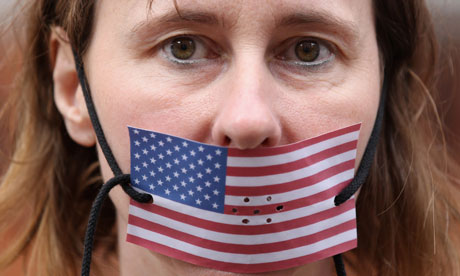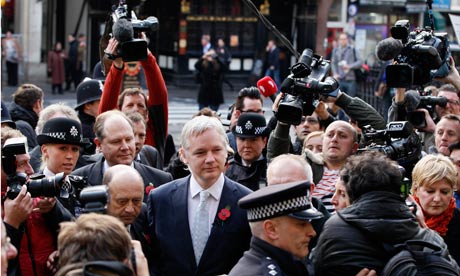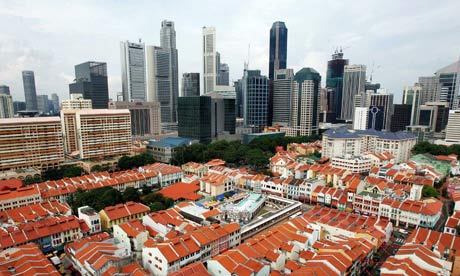Ecuador is pressing for a deal that offers justice to Assange's accusers – and essential protection for whistleblowers

A supporter of Julian Assange, the WikiLeaks founder, outside the Ecuadorean embassy in London. Photograph: Oli Scarff/Getty
Considering he made his name with the biggest leak of secret government documents in history, you might imagine there would be at least some residual concern for Julian Assange among those trading in the freedom of information business. But the virulence of British media hostility towards the WikiLeaks founder is now unrelenting.
This is a man, after all, who has yet to be charged, let alone convicted, of anything. But as far as the bulk of the press is concerned, Assange is nothing but a "monstrous narcissist", a bail-jumping "sex pest" and an exhibitionist maniac. After Ecuador granted him political asylum and Assange delivered a "tirade" from its London embassy's balcony, fire was turned on the country's progressive president, Rafael Correa, ludicrously branded a corrupt "dictator" with an "iron grip" on a benighted land.
The ostensible reason for this venom is of course Assange's attempt to resist extradition to Sweden (and onward extradition to the US) over sexual assault allegations – including from newspapers whose record on covering rape and violence against women is shaky, to put it politely. But as the row over his embassy refuge has escalated into a major diplomatic stand-off, with the whole of South America piling in behind Ecuador, such posturing looks increasingly specious.
Can anyone seriously believe the dispute would have gone global, or that the British government would have made its asinine threat to suspend the Ecuadorean embassy's diplomatic status and enter it by force, or that scores of police would have surrounded the building, swarming up and down the fire escape and guarding every window, if it was all about one man wanted for questioning over sex crime allegations in Stockholm?
To get a grip on what is actually going on, rewind to WikiLeaks' explosive release of secret US military reports and hundreds of thousands of diplomatic cables two years ago. They disgorged devastating evidence of US war crimes and collusion with death squads in Iraq on an industrial scale, the machinations and lies of America's wars and allies, its illegal US spying on UN officials – as well as a compendium of official corruption and deceit across the world.
WikiLeaks provided fuel for the Arab uprisings. It didn't just deliver information for citizens to hold governments everywhere to account, but crucially opened up the exercise of US global power to democratic scrutiny. Not surprisingly, the US government made clear it regarded WikiLeaks as a serious threat to its interests from the start, denouncing the release of confidential US cables as a "criminal act".
Vice-president Joe Biden has compared Assange to a "hi-tech terrorist". Shock jocks and neocons have called for him to be hunted down and killed. Bradley Manning, the 24-year-old soldier accused of passing the largest trove of US documents to WikiLeaks, who has been held in conditions described as "cruel and inhuman" by the UN special rapporteur on torture, faces up to 52 years in prison.
The US administration yesterday claimed the WikiLeaks founder was trying to deflect attention from his Swedish case by making "wild allegations" about US intentions. But the idea that the threat of US extradition is some paranoid WikiLeaks fantasy is absurd.
A grand jury in Virginia has been preparing a case against Assange and WikiLeaks for espionage, a leak earlier this year suggested that the US government has already issued a secret sealed indictment against Assange, while Australian diplomats have reported that the WikiLeaks founder is the target of an investigation that is "unprecedented both in its scale and its nature".
The US interest in deterring others from following the WikiLeaks path is obvious. And it would be bizarre to expect a state which over the past decade has kidnapped, tortured and illegally incarcerated its enemies, real or imagined, on a global scale – and continues to do so under President Barack Obama – to walk away from what Hillary Clinton described as an "attack on the international community". In the meantime, the US authorities are presumably banking on seeing Assange further discredited in Sweden.
None of that should detract from the seriousness of the rape allegations made against Assange, for which he should clearly answer and, if charges are brought, stand trial. The question is how to achieve justice for the women involved while protecting Assange (and other whistleblowers) from punitive extradition to a legal system that could potentially land him in a US prison cell for decades.
The politicisation of the Swedish case was clear from the initial leak of the allegations to the prosecutor's decision to seek Assange's extradition for questioning – described by aformer Stockholm prosecutor as "unreasonable, unfair and disproportionate" – when the authorities have been happy to interview suspects abroad in more serious cases.
And given the context, it's also hardly surprising that sceptics have raised the links with US-funded anti-Cuban opposition groups of one of those making the accusations – or that campaigners such as the London-based Women Against Rape have expressed scepticism at the "unusual zeal" with which rape allegations were pursued against Assange in a country where rape convictions have fallen. The danger, of course, is that the murk around this case plays into a misogynist culture in which rape victims aren't believed.
But why, Assange's critics charge, would he be more likely to be extradited to the US from Sweden than from Britain, Washington's patsy, notorious for its one-sided extradition arrangements. There are specific risks in Sweden – for example, its fast-track "temporary surrender" extradition agreement it has with the US. But the real point is that Assange is in danger of extradition in both countries – which is why Ecuador was right to offer him protection.
The solution is obvious. It's the one that Ecuador is proposing – and that London and Stockholm are resisting. If the Swedish government pledged to block the extradition of Assange to the US for any WikiLeaks-related offence (which it has the power to do) – and Britain agreed not to sanction extradition to a third country once Swedish proceedings are over – then justice could be served. But with loyalty to the US on the line, Assange shouldn't expect to leave the embassy any time soon.




